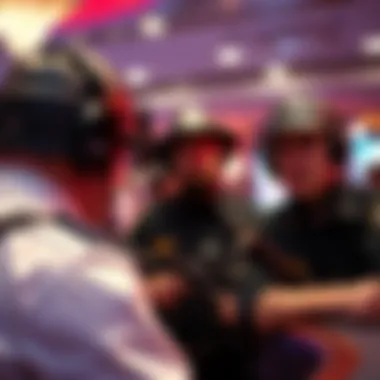Analyzing Casino Security Measures and Innovations


Intro
In the high-stakes world of gaming, the integrity and safety of both assets and patrons are of utmost importance. The delicate balance between providing a thrilling experience and ensuring a secure environment is what casino operators strive to achieve. As the casinos have evolved, so too have the methods employed to protect their premises. In this exploration of casino security systems, we will journey through the intricacies of security measures, examining how they have transformed over the years and how technology plays an integral role.
While gambling might be known for its glitz and glamour, behind the scenes, it’s a whole different ballgame. Security systems blend old-school tactics with cutting-edge technology to create a fortress-like atmosphere, reassuring both players and managers alike. This article delves into the various layers of security—from the ever-watchful eyes of surveillance cameras to the essential training protocols for staff.
Through this discussion, we aim to shed light on how the combination of traditional approaches and modern innovations elevates the security landscape in the gaming industry. Not only will this provide insights into their effectiveness, but it will also highlight the challenges faced in this ever-evolving realm. Understanding these facets is vital for ensuring a safe gambling environment. So buckle up, as we take a closer look at the strategies that keep the game fair and secure.
Preamble to Casino Security
In the bustling world of casinos, where fortunes are made and lost in the blink of an eye, the topic of security stands paramount. Security systems in casinos are not merely an afterthought; they are the backbone of operational integrity and customer confidence. In an environment teeming with both excitement and unpredictability, the complexities surrounding casino security must be thoroughly understood.
Understanding the Importance
The significance of casino security can be observed from various angles. First and foremost, the primary objective is asset protection. Casinos operate with vast sums of money, whether in cash or in the form of chips. Without robust security measures, these assets are vulnerable to theft, fraud, and other illicit activities.
Beyond safeguarding tangible assets, casino security serves to protect patrons. In a space where individuals are deeply engaged in gambling, it is crucial to foster a sense of safety. Patrons who feel secure are likely to spend more time and money, which aligns with the casino's business objectives. However, security must walk a fine line; an atmosphere that feels overly scrutinized can deter visitors, undermining the very experience that drew them in.
Key Elements of Casino Security
The components of casino security are extensive and varied, each playing vital roles in the overarching strategy:
- Surveillance systems: High-definition cameras monitor every inch, allowing for real-time observation and potential intervention.
- Access control: Limiting entry to sensitive areas ensures that only approved personnel can access critical resources.
- Training of personnel: Employees are not just there to serve; they are trained to recognize suspicious activities and report them effectively.
The integration of technology, human oversight, and regulatory frameworks creates a layered defense against potential threats. Moreover, the continuous evolution of these systems ensures they adapt to new challenges.
"Security is more than just a set of procedures; it is a culture woven into the very fabric of casino operations."
To summarize, understanding casino security is essential not just for operational effectiveness but also for creating an engaging atmosphere where patrons feel valued and protected. The intricate dance of technology and human action lays the groundwork for a secure gaming experience, allowing for both enjoyment and profitability. As we delve further into the various components and innovations within casino security systems, it becomes clear that this topic is not just about prevention; it's about fostering trust in a high-stakes environment.
Historical Context of Casino Security
Understanding the development of casino security is key to grasping how contemporary measures have emerged. The landscape of security in gaming establishments has not stood still; it has seen tremendous change over the decades. Before diving into the nitty-gritty of modern approaches, we must first ponder how history shaped the present.
The significance of exploring the historical context is not just an academic exercise; it allows us to appreciate the challenges that came before us. Knowing the early methods helps in understanding why today’s sophisticated security systems incorporated various layers and technologies. The evolution of security protocols directly reflects the shifting dynamics of crime, patron behavior, and technological advancements that casinos had to contend with.
Early Security Methods
In the alluring world of casinos, where the stakes are high, the early days of security were often naive compared to current standards. Back when casinos first sprang up, security wasn’t as refined as it is now. Most gambling houses relied on basic measures: the watchful eyes of floor staff and an understanding of familiar faces. A bouncer or a few attentive dealers might have served as the first line of defense against petty theft and fraud.
Most early methods depended on a system of trust and observation, a kind of informal setup where loyal patrons were assumed to be harmless. However, this was quite a hit-or-miss approach. Crimes ranging from simple cheating to larger, more organized heists did occur, and because there weren’t structured security measures, these incidents rarely ended with apprehensions.
- Miscreants used sleight-of-hand tricks to deceive dealers, which led to
- The house edge often called upon the intuition of seasoned staff to sniff out dishonest play.
With the rise of popularity in casinos came a need for better or perhaps "more formalized" security measures. Special attention was given to addressing cheating methods, as technological advancements began creeping into the scene. Employing security personnel who had backgrounds in law enforcement or military roles became more common, albeit still limited.
The Evolution of Security Protocols
Fast forward to the late 20th century, and the expansion of casinos sparked a dramatic shift in security protocols. As gambling became more mainstream, regulations also erupted, indicating that something more sophisticated was needed. Enter technological advancements. From the 1980s on, integration of electronics marked a decidedly new chapter in casino security.
CCTV cameras started appearing in key areas, making it difficult for cheats to operate without being noticed. Perhaps the most notable transformation came with the introduction of surveillance rooms. These hubs, staffed by trained security personnel, used real-time video feeds to monitor activities across the casino floor.
Key aspects of this evolution included:
- Use of Technology: Surveillance systems transformed from simple cameras to complex networks capable of tracking behavior patterns.
- Regulatory Changes: National and state regulations set guidelines for what was mandatory in terms of security measures, ensuring casinos were taking their responsibilities seriously.
- Swifter Responses: The implementation of protocols for immediate action in the event of suspicious activity changed the game dramatically. Security was no longer reactive but proactive.
As the line between gaming and security blurred, casinos began to invest in training programs for their staff, aiming to cultivate a culture of awareness among employees. This shift emphasized the importance of integrating human oversight with technological support, which is still very much in play today.
Finale of Historical Context
The evolution from rudimentary methods to sophisticated systems reflects the ongoing battle between casinos and those determined to cheat the system. Understanding this historical context highlights how the casino industry has always had to adapt, recognizing that staying one step ahead of potential threats is necessary not just for profit, but for maintaining a safe environment for patrons to enjoy.
Components of Modern Casino Security Systems
A casino's reputation hinges not only on the games they offer but also on the security measures designed to protect both patrons and assets. Understanding these components is essential to comprehend how casinos operate safely and efficiently. The modern security systems in place are intricate, weaving together technology, personnel, and protocols that ultimately create a fortress-like atmosphere. In this section, we explore the significant elements, their benefits, and the considerations at play.
Surveillance Infrastructure
CCTV Technology
CCTV remains the backbone of any casino's security framework. It allows for constant monitoring of the gaming floor, ensuring that any suspicious activity does not go unnoticed. One critical characteristic of CCTV technology is its ability to record high-definition video, giving security personnel the detail needed to investigate incidents thoroughly. This is a popular choice among casinos, owing to its reliability and relatively low cost.
One unique feature is the ability to integrate with other systems, such as alarm and access control systems, creating a seamless security network. However, despite its many advantages, heavy reliance on CCTV can lead to privacy concerns among visitors, who may feel uneasy under constant watch.
Remote Monitoring Capabilities
With advancements in technology, casinos are now able to monitor surveillance feeds remotely. This means security teams can keep an eye on multiple locations, providing flexibility and responsiveness. The key characteristic here is the convenience of overseeing multiple camera angles from various sites in real-time.
This technology is beneficial as it allows for quick responses to incidents from anywhere, optimizing not just manpower but also time—a crucial element in emergencies. Yet, while remote monitoring enhances security, it could also result in delayed action if personnel are not adequately trained to react swiftly to situations observed from a distance.
Facial Recognition Systems


Facial recognition systems enhance the basic monitoring provided by CCTV. These systems analyze facial features to identify individuals, which can be particularly useful in recognizing banned players or identifying suspicious behavior. The key aspect of facial recognition is its automation; it takes human error out of the equation, providing casinos with a more accurate method of monitoring patrons.
Though advantageous in streamlining security responses, concerns about personal data and potential abuses of privacy remain prevalent. Balancing effective monitoring with ethical standards is now a critical conversation within the industry.
Access Control Measures
Verification Processes
ID verification processes are fundamental in restricting access to authorized individuals only. These processes often incorporate various technologies, such as magnetic stripe readers and biometric scanning. The key characteristic is the emphasis on ensuring that only those of legal gambling age and authorized personnel enter gaming areas.
Implementing strict ID verification is an immensely beneficial way to maintain compliance with local regulations. However, one downside could be the potential inconvenience it might cause customers as they are forced to show identification before entering, which could deter some patrons.
Restricted Area Management
Restricted areas are set up in casinos to ensure that sensitive areas, such as gaming tables or cash storage, remain secure. Key characteristics of effective restricted area management include clear signage and monitored access points. This systematic approach helps in maintaining an orderly flow of personnel.
The benefit of these systems lies in their effectiveness at preventing unauthorized access, thereby safeguarding valuable assets within the casino. Conversely, strict measures might lead to operational delays, especially if staff must validate credentials at multiple checkpoints.
Employee Access Protocols
Employee access protocols dictate which staff members can enter certain areas within the casino. This is critical for both safety and operational efficiency. The key feature of these protocols is that they are typically tiered, meaning that access rights vary depending on the role and necessity.
This system helps limit access to sensitive information and secure areas. However, one challenge posed by restrictive access is the potential for lower morale among employees who may feel they are being overly monitored or controlled.
Alarm Systems and Response Teams
Intrusion Detection
Intrusion detection systems play a crucial role in alerting security teams about unauthorized access attempts. These systems can include motion detectors and glass-break sensors, providing a beneficial layer of defense. Their key characteristic is real-time alerts, allowing for immediate action should an intrusion occur.
The advantage of having these systems in place is the peace of mind they provide. However, excessive false alarms can undermine the credibility and effectiveness of these systems, potentially leading to complacency among security personnel.
Emergency Response Plans
Emergency response plans outline the protocols that should be followed in various crisis situations, from medical emergencies to security threats. One key characteristic of these plans is their comprehensive nature, which emphasizes thorough training and drills. This preparation uplifts the overall safety level within the casino.
The unique feature of a well-structured emergency response plan is the synergy it creates among staff, leading to efficient communication and coordination. Nevertheless, if plans are too rigid, they might hinder the adaptability required in the fast-changing environment of a casino.
Collaboration with Law Enforcement
Having a collaborative relationship with local law enforcement agencies is invaluable. This partnership enhances response time and establishes a clear protocol for escalating matters beyond internal security. The main advantage of collaboration is the pooled resources and expertise, which can greatly enhance operational security while reassuring patrons.
However, relying on external entities could potentially lead to complications during crises if procedures are not thoroughly communicated and understood by all parties involved.
Through exploring these components, it is evident that modern casino security systems rely on a combination of advanced technology and human oversight. As the landscape of casino operations continues to evolve, so too must the strategies employed to ensure safety and security.
Human Element in Casino Security
The role of the human element within casino security is pivotal, enhancing the effectiveness of technical systems while weaving an intricate web of vigilant oversight. Without dedicated personnel, the best cameras and alarm systems can fall short. The integration of human intuition and training alongside technology ensures a holistic approach to security, effectively mitigating risks and fostering a secure gaming environment. Staff members serve not merely as enforcers of policy but as proactive facilitators who enhance overall patron experience, which is crucial in maintaining a successful casino operation.
Security Personnel Training
Continuous Education Programs
Continuous education programs for security personnel are designed to evolve alongside the rapidly changing landscape of casino security and its related challenges. These programs emphasize importance of regular training to keep staff updated on the latest security technologies and tactics. A key characteristic of these programs is their ability to adapt to current trends and threats, making them a beneficial choice for any casino aiming for preventive security measures. The unique aspect of continuous education is its commitment to lifelong learning, which is increasingly recognized as an advantage because it empowers staff against emerging threats, ensuring they remain well-equipped to handle a variety of situations.
Crisis Management Training
Crisis management training outlines how to effectively respond to unanticipated incidents, from potential robberies to patrons exhibiting dangerous behavior. This kind of training is vital, as it prepares staff not just to react, but to foresee potential crises before they escalate. The key feature here is the implementation of simulations that mimic real-life scenarios, making the experience all the more engaging and educational. However, there are complexities to consider; while this training can significantly help in emergencies, it may demand significant resources in terms of time and finances, which smaller casinos might find challenging.
Customer Service Skills
Customer service skills in security personnel help to create a welcoming atmosphere while also ensuring safety. This dual focus makes security staff approachable yet vigilant, a rather advantageous blend for casinos aiming to maintain a hospitable environment. The key characteristic is the emphasis on communication techniques that de-escalate potential conflicts before they become larger issues. An impressive unique feature is the recognition of security as a part of customer service rather than a separate entity — this perspective can improve the guest experience. The downsides, however, include the possibility that a heavy emphasis on service might dilute enforcement effectiveness, leading to over-familiarity with patrons that could be counterproductive.
Role of Staff in Surveillance
Observation Techniques
Observation techniques play a crucial role in identifying suspicious activities that technology alone may miss. Staff trained in these techniques possess the knack for critical thinking, developing an instinct for spotting anomalies that might escape an algorithm. A vital characteristic of this training is the balance between being discreet while remaining attentive, ensuring that the gaming environment feels comfortable and not overly monitored. The unique advantage lies in the personal touch that human observation can provide, something that automated systems can't replicate. However, the subjective nature of human judgment can sometimes lead to misunderstandings if not trained properly.
Reporting Procedures
Reporting procedures outline how and when to document incidents, ensuring that every detail is captured for future reference. This aspect of casino security is vital, as proper documentation aids investigations and legal matters. The key characteristic of effective reporting is clarity and promptness, reducing the chances of miscommunication. The unique feature of these procedures is the standardization adopted across security teams, which allows for uniformity and reliability. Conversely, over-reliance on these procedures without adaptability can lead to bureaucratic delays, hindering immediate response actions when necessary.
Engagement with Patrons
Engagement with patrons is essential in building rapport while simultaneously enhancing security. Creating personal connections with guests allows security staff to blend safety with service, making patrons feel at ease in asking for help. The key characteristic here is an emphasis on empathy and friendliness—the essential qualities needed to build trust. A unique feature of this engagement is its dual role for staff as both enforcers and ambassadors of the casino's values. However, staff may struggle with distinguishing their roles at times, and not all patrons may appreciate being approached by security, which could result in discomfort for guests.
"The human touch in security can often make all the difference between a mere place to gamble and a secure haven of entertainment."


Technological Innovations in Casino Security
In the realm of casino security, innovation plays a crucial role in not just protecting assets but also refining operational efficiency. The integration of advanced technologies reshapes how casinos approach their security protocols. From cutting-edge surveillance systems to robust access control measures, these innovations are essential to combat the ever-evolving threats faced in the gambling industry. They do more than just safeguard against crime; they ensure patrons feel secure and valued, enhancing the overall experience in the establishment.
Integration of Artificial Intelligence
The adoption of Artificial Intelligence (AI) in casino security marks a significant milestone in how operations are monitored and managed. AI systems utilize vast amounts of data to detect patterns and anomalies, offering real-time insights into potential security threats. One of the standout features of predictive analysis is its ability to foresee problematic behavior before it escalates. This preemptive capability makes it an invaluable asset in maintaining a safe gaming environment.
Predictive Analysis
Predictive analysis stands out as one of the most transformative aspects of AI in security. By analyzing historical data, this technology can predict future incidents and potential risks. It allows security personnel to act proactively rather than reactively, preventing issues before they arise. The beauty of predictive analysis lies in its adaptability; as it continues to learn from new data, its accuracy improves continuously.
An advantage of predictive analysis is that it can tune into unusual patterns of behavior, which, when combined with other technology, can spot likely cheating or theft before it happens. However, this reliance on technology raises a question of privacy. Customers may feel uneasy knowing their behavior is being constantly analyzed. Navigating this balance is something that casinos must address.
Behavioral Recognition
Behavioral recognition is another significant innovation within the realm of AI, allowing security systems to interpret the actions of individuals on the casino floor. This includes understanding body language, gestures, and even social interactions to identify irregular behaviors that might indicate cheating or intent to commit fraud.
The key characteristic of behavioral recognition is its focus on human psychology. It attracts interest due to its potential to enhance security personnel's ability to manage risk effectively. While this technology can flag unusual behavior effectively, it also has its drawbacks. Misinterpretations can lead to false positives, potentially humiliating innocent patrons or causing unwarranted disruptions to play.
Efficiency Improvements
Moving beyond merely observing, the efficiency improvements brought by AI technologies streamline operations drastically. Automated processes such as data entry and incident reporting free up security staff to focus on more hands-on tasks. This efficiency is vital within a bustling casino environment, where moment-to-moment decisions can have significant implications.
Featuring real-time monitoring, AI-driven systems allow for rapid responses to incidents. The speed at which these efficiencies can be achieved is impressive, and it can lead to reduced operational costs in the long run. Nevertheless, there is a downside: heavy reliance on technology can lead to vulnerabilities in the absence of human oversight. A comprehensive approach that marries the efficiency of machines with the intuition of trained professionals is crucial for optimal results.
Emerging Technologies
The landscape of security in the gaming industry isn't just limited to AI. Emerging technologies are transforming how security measures are constructed and applied. Key innovations like blockchain security solutions, mobile surveillance units, and the Internet of Things (IoT) are setting new standards for safety protocols.
Blockchain Security Solutions
Blockchain technology offers a decentralized method for securing data transactions. It ensures transparency and integrity, making it virtually impossible to alter information without detection. In the casino industry, using blockchain can enhance security of transactions, thereby reducing fraud risk. This reliability characteristic is why many casinos see promise in blockchain.
A unique feature of blockchain solutions is that they offer a tamper-proof record of all transactions. However, despite its advantages, the technology may still present challenges in terms of integration with existing systems and a learning curve for employees.
Mobile Surveillance Units
In a dynamic casino environment, mobile surveillance units bring flexibility and rapid response capabilities. These units allow for coverage of areas that fixed cameras might miss, enhancing overall security presence. This adaptability is crucial as it enables security teams to respond to incidents outside traditional surveillance areas quickly.
Not only can these units move in real-time as situations demand, but they also tend to be less obtrusive, creating a more relaxed gaming atmosphere for patrons. On the flip side, managing these units effectively can demand high coordination and staff training to ensure effectiveness.
IoT Applications
The Internet of Things (IoT) has found its way into casino security as well. By interconnecting devices—from surveillance cameras to alarms—IoT applications create a web of security measures that provide holistic oversight. This connectivity allows for comprehensive monitoring, where any breach or signal is immediately communicated to security personnel.
The significant advantage of IoT applications lies in their capacity for automation and real-time alerts. However, introducing numerous connected devices raises concerns regarding cybersecurity, as any vulnerability has the potential to compromise the entire system.
In summary, technological innovations in casino security are advancing rapidly, and each new technology offers both benefits and challenges. The blend of AI, IoT, and blockchain is reshaping how security systems operate in these gaming environments.
Challenges Facing Casino Security Systems
In the realm of gaming, where fortunes can shift with a roll of the dice, security systems face formidable challenges that can never be completely anticipated. These obstacles are critical for casinos, as they combine the necessity of protecting both assets and patrons while also ensuring a lively atmosphere. Addressing these issues requires thoughtful strategies, and it becomes paramount to examine both the risks and the approaches taken to mitigate them.
Combatting Fraud and Cheating
Identifying Cheating Methods
A key component of combating fraud in casinos is understanding how cheating manifests within this complex environment. From card counting in blackjack to collusion among players, identifying cheating methods involves a keen analytical eye and a proactive approach. Casinos rely on a mixture of sophisticated technology and human intuition to spot anomalies. For instance, the use of video analytics paired with a trained security team helps minimize instances of dishonesty.
This practice holds significance in the casino security playbook, as identifying cheating methods not only protects revenue but also helps maintain reputational integrity. The key characteristic here is adaptability; casinos must constantly evolve their methods to keep pace with developing trends in cheating strategies. However, a potential drawback lies in false positives, which might lead to wrongly accusing innocent players if not handled delicately.
Countermeasures and Prevention
Once cheating methods are identified, devising countermeasures becomes essential. Installing robust surveillance systems, employing trained personnel to monitor gaming floors, and integrating AI for advanced analytics are all part and parcel of preventive strategies. Each casino must tailor these measures to its specific environment, weighing the costs of implementation versus potential losses from ongoing fraud.
The primary feature of this approach is its focus on deterrence; by making it difficult for wrongdoers to act, casinos can minimize occurrences significantly. Still, these strategies can create a tense atmosphere if players feel overly surveilled. It’s a balancing act, indeed.
Legal Implications
Navigating the legal landscape surrounding casino operations adds another layer of complexity. Regulations vary widely across jurisdictions, and misunderstanding the legal implications of surveillance practices can result in serious repercussions. It's not just about maintaining security but also about ensuring compliance with laws governing privacy and surveillance.
The characteristic of this topic is two-fold—casinos must protect their interests while respecting player rights. It’s advantageous because adherence to regulations fosters trust among patrons, while failing to comply can lead to hefty fines and a tarnished reputation. The complexities arise from differing legal standards and interpretations, particularly as technologies evolve.
Balancing Security and Customer Experience
Minimizing Intrusion
In the pursuit of robust security, minimizing intrusion is a vital aspect. As casinos implement tighter monitoring measures, it's important to keep the gaming experience inviting rather than alienating. Striking a balance means that while security protocols are essential, ensuring that guests feel comfortable is equally paramount. The hallmark of this approach is subtlety; effective security shouldn't make its presence felt in an overtly noticeable manner. Therefore, employing less invasive technologies, such as discreet cameras or unobtrusive monitoring methods, can enhance the security posture without compromising user experience. However, there lies the challenge of ensuring that such measures are still effective.
Enhancing User Engagement
An engaged patron is more likely to feel welcome and secure, enhancing their overall experience. Casinos that actively foster relationships with customers and involve them in promotions, loyalty programs, or interactive gaming often see a benefit. This engagement provides valuable insight into player habits, and thus potential risks can be identified earlier.
Key characteristics involve personalization and attentiveness; when patrons see staff who remember them and take note of their preferences, it builds trust. Yet, the cost of training staff to deliver this level of service can be substantial, and over-engagement may also deter those who seek privacy while gambling.


Maintaining a Welcoming Environment
The atmosphere of a casino must exude warmth and welcome, while still being vigilant against threats. It requires finding ways to integrate security measures that are accommodating rather than off-putting. Designing spaces with clear signage, helpful staff, and visible but unobtrusive security aids in achieving this goal.
The unique feature of maintaining a welcoming environment lies in its dual objective—to keep patrons returning while ensuring their safety. This balance plays a crucial role in retaining customer loyalty, and when achieved, can lead to a thriving casino culture. However, overly heavy-handed security can detract from, rather than enhance, the ambience, risking the loss of clientele.
"Effective casino security is not just about the tools and technology, it’s about how those elements fit seamlessly into an enjoyable customer experience."
The challenges faced by casino security systems highlight the need for an adaptable and thoughtful approach. By understanding and addressing issues such as fraud, balancing security measures with customer experience, and navigating legal frameworks, casinos can foster an environment that is both secure and inviting for patrons.
Regulatory Framework for Casino Security
Understanding the regulatory framework governing casino security is paramount for several reasons. It ensures that casinos maintain a level of integrity, transparency, and accountability, which in turn builds trust with both patrons and the broader community. These regulations are put in place to prevent fraud, promote responsible gaming practices, and protect patrons' rights while they engage in various forms of gambling. Without a solid regulatory framework, the risk of criminal activities, such as money laundering or cheating, can significantly increase.
The regulatory environment provides a structure within which casinos operate. This includes guidelines for security measures, requirements for staff training, and protocols for emergency response. In essence, these regulations set the standards that casinos must adhere to, which ensures that they are not just compliant but are also proactively working to bolster their security posture.
Furthermore, regulation helps casinos to stay aligned with best practices. As the gaming landscape evolves, regulations are often updated to reflect new trends, threats, and technologies. Therefore, compliance transforms from a mere checkbox exercise into a dynamic practice that requires continuous improvement and adaptation to the latest standards.
Compliance with Gaming Regulations
Compliance with gaming regulations is a core component of casino operations. Regulatory bodies, like the Nevada Gaming Control Board, set forth numerous stipulations that casinos must follow. These rules encompass every facet of operation from the management of gaming devices to the surveillance of gaming floors. Being compliant is not just a legal necessity; it also reinforces a casino's reputation in the competitive landscape.
- Audits and Reviews: Regular audits are conducted to assess compliance. These evaluations often focus on security protocols, staff conduct, and adherence to operational guidelines. Any discrepancies can lead to severe penalties, including fines or loss of license.
- Documentation & Reporting: Casinos are often required to keep detailed records. This includes transaction logs, employee training certifications, and security incident reports. Proper documentation allows casinos to prove their compliance during inspections.
"The best defense against potential security threats is an effective compliance strategy."
In this regard, a proactive approach tends to yield better results. Building a strong compliance culture not only mitigates risks but can enhance overall operational efficiency.
Licensing and Security Requirements
The licensing process for casinos is rigorous, intended to ensure that applicants meet stringent standards for security, ethics, and financial management. Before a casino receives its license, it undergoes a comprehensive review of its security measures.
- Background Checks: All key personnel must pass thorough background checks, ensuring there are no hidden criminal histories that could pose a risk to the establishment. This step is crucial in maintaining a trustworthy environment for patrons.
- Security Plan Submission: Casinos are often required to submit a detailed security plan that outlines surveillance technologies, access controls, and emergency protocols. This plan must be regularly updated and subject to review as part of the licensing conditions.
- Ongoing Security Evaluations: After receiving a license, casinos must consistently demonstrate compliance with security requirements. This includes regular reviews by regulatory bodies to ensure that the casino remains in good standing.
It’s clear that the licensing and security requirements are not mere formalities but are essential for creating a secure gaming environment. This framework supports casinos in maintaining their operations legally and effectively, reassuring patrons that they are participating in a safe and secure setting.
Future Trends in Casino Security
The landscape of casino security is constantly evolving, driven by technological advancements and the changing needs of patrons. Understanding future trends in casino security is vital for both operators and law enforcement agencies. This section focuses on the emerging patterns that can redefine safety and provide an enhanced experience for all stakeholders. Security isn't just about preventing crime; it's about creating an environment where patrons feel secure while enjoying their time at the tables or slot machines.
Adaptive Security Measures
Real-time Data Analytics
Real-time data analytics is becoming an indispensable tool in casino security. This approach allows security professionals to track player behavior and detect suspicious activities as they happen. As a direct response to incidents, immediate data processing can identify anomalies in gaming patterns or financial transactions.
An important feature of real-time analytics is its speed. This speed enables security teams to react swiftly, decreasing potential losses from fraud or other illicit activities. Moreover, its predictive capabilities enhance surveillance operations by anticipating potential threats before they escalate. One downside is that reliance on data analysis may overlook certain subtle human behaviors, necessitating a balance between technology and human observation.
Dynamic Risk Assessment
Dynamic risk assessment plays a crucial role in adapting security protocols to ongoing threats. This method assesses risks based on changing circumstances rather than using static guidelines. It can incorporate data from various areas of the casino, including customer interactions and environmental conditions. Its flexibility is one of its main strengths. This adaptability allows for real-time modifications, tailoring security responses to immediate risks.
However, the complexity of developing such systems can be a challenge. It demands continuous monitoring and updates from security staff, which may lead to resource constraints. Successful implementation hinges on striking a balance between thorough assessments and operational efficiency.
Personalized Security Protocols
Personalized security protocols focus on individual patrons, offering a tailored approach to safety. By analyzing player tendencies and preferences, casinos can create a more engaging and secure environment. An important benefit of this method is its ability to enhance customer loyalty, as patrons feel valued when their unique needs are addressed.
The unique characteristic of personalized protocols is the emphasis on understanding behaviors and preferences. This tailored approach can increase security effectiveness without hindering the overall experience. Nevertheless, there are potential drawbacks, such as privacy concerns and the burden of managing massive amounts of personal data. Securing consent and maintaining customer trust are crucial elements in implementing such systems effectively.
Sustainability in Security Operations
As casinos increasingly integrate sustainability into their operations, security measures are no exception. Future trends indicate a move towards eco-friendly practices that align security operations with broader corporate responsibility goals. This shift not only address today’s ecological concerns but also appeals to a growing audience conscious of environmental impact.
Eco-friendly Surveillance Technologies
Eco-friendly surveillance technologies utilize energy-efficient systems and reduce resource use without compromising security quality. For instance, solar-powered cameras can be used in outdoor areas, making them both cost-effective and environmentally friendly.
A key aspect of this technology is its minimal carbon footprint. It represents a conscious effort to align with eco-friendly initiatives. However, initial investments might be higher compared to traditional methods, posing a challenge to budget-conscious operations.
Resource Management
Effective resource management in security operations entails optimizing systems to reduce waste. Inventory management and deployments can lead to significant cost savings while improving security efficiency. A critical characteristic of this strategy is its focus on interfaces that can consolidate resources across different departments, creating a unified approach to security.
Nonetheless, careful implementation is required to ensure that resource allocation doesn’t compromise security quality or speed of response, which is essential in crisis situations.
Corporate Responsibility
Corporate responsibility is becoming an integral part of casino operations, including security. This involves not only the safety of patrons but also their overall welfare and the environment. A committed approach to corporate responsibility can enhance the casino's reputation. The significance of a responsible operation often leads to positive public relations, which can be crucial in the highly competitive gaming industry.
One unique feature of corporate responsibility is its capacity to integrate customer feedback into security operations. Patrons appreciate when their voices are heard and implemented in maintaining their safety. On the downside, maintaining such commitments can demand considerable time and resources, which may stretch operational capabilities if not effectively managed.
"In the future, security systems won't just protect; they'll enhance the overall gambling experience, making safety part of the enjoyment, rather than an afterthought."
Closure: The Future of Casino Security
As we look to the horizon, the landscape of casino security is poised for significant change, driven by innovations and evolving threats. The importance of this topic cannot be overstated. Security systems in casinos not only protect assets against theft and cheating but also ensure the safety and comfort of patrons, which ultimately translates to trust and loyalty in an industry built on entertainment and chance.
Key Considerations Going Forward
- Integration of Advanced Technology
As casinos increasingly embrace technology, the use of advanced surveillance and data analytics will become more prevalent. Systems that leverage artificial intelligence to predict suspicious behavior can enhance the effectiveness of a security strategy. Predictive modeling may allow security personnel to address potential issues before they escalate. - Balancing Security and Customer Experience
Striking the right balance between security and customer engagement is critical. As measures become more rigorous, there is a risk that patrons may feel monitored in a way that detracts from their experience. Thus, future security strategies should include approaches that integrate seamlessly into the casino environment, making them nearly invisible to guests while ensuring their safety. - Human Element Remains Vital
Despite the growing reliance on technology, the human element remains irreplaceable. Trained personnel will always play a crucial role in identifying nuances that technology might overlook. This foundation must be strengthened through ongoing training programs that emphasize crisis management and customer relations. - Legal and Regulatory Frameworks
With rapid evolution comes the necessity for updated legal frameworks that can address new technologies and methods. Regulations governing surveillance systems and personal data must adapt to ensure both compliance and the protection of individual rights. Stakeholders need to collaborate on these evolving standards to create a safe and fair gaming environment for all. - Sustainability Goals
Beyond operational efficiency, sustainability in security practices is gaining traction. Casinos will increasingly look to implement eco-friendly technologies as part of their operational ethos. Not only does this minimize their carbon footprint, but it also resonates well with a socially conscious clientele that values corporate responsibility.
"Security in casinos is not just about keeping watch; it’s about envisioning a safer experience through innovation."
— Anonymous Security Expert
The Path Ahead
In summary, the future of casino security is multifaceted and dynamic. It must evolve to meet new threats while considering the patrons' experience. As technology continues to advance and the gaming landscape shifts, a proactive approach combining human insight and sophisticated technology will define the new era of casino security. Engaging with these changes thoughtfully allows casinos not only to safeguard their assets but also to foster an welcoming atmosphere for all.
As we envision what lies ahead, it's evident that an investment in security is not merely a necessity but a commitment to enhancing the entire gambling experience — protecting both the players who risk their money and the integrity of the gaming environment. For more insights into gambling regulations and security considerations, visit Britannica or read discussions on platforms like Reddit.







